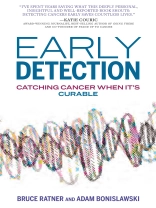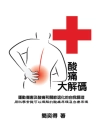‘A lucid, persuasive case for overhauling diagnosis regimes to catch cancer early rather than late.’
—Kirkus Reviews
Catching cancer early remains the single best way to combat a disease that is the second-leading killer in both the US and worldwide. But the vast majority of resources in the fight against cancer are devoted to relatively ineffective late stage treatments. Early Detection examines this important anomaly in an accessible and expertly researched survey.
In a co-authorship that brings together the passion and urgency of someone touched deeply by the experience of cancer with the knowledge of a skilled science writer, Ratner and Bonislawski narrate compelling case studies across a range of screening programs and different forms of cancer. They look at the science underpinning early detection and discuss the organizational and social challenges of widespread screening, a dimension that has been shown to be especially important in the COVID-19 pandemic. And they call for the government and the medical establishment to provide resources for expanding screening, especially in economically disadvantaged communities that have traditionally been underserved.
Mengenai Pengarang
Bruce Ratner has led an eclectic life. After focusing much of his undergraduate coursework on math, biology, and physics, he started his career in law and public service as an assistant professor at New York University Law School and Commissioner of Consumer Affairs under Mayor Ed Koch. In his late 30s, he moved into real estate, becoming one of the city’s largest developers. In 2016, Ratner’s brother, Michael, died of metastatic cancer. Through this tragedy, Ratner came to realize that early detection was the key to reducing cancer mortality. Following his brother’s death, he founded a non-profit, the Michael D. Ratner Center for Early Detection of Cancer, to research and promote better cancer screening. He is on the boards of Memorial Sloan Kettering Cancer Center, Weill Cornell Medical Center, and the Cold Spring Harbor Laboratory.
Adam Bonislawski is a science writer with more than 10 years of experience covering genomic and proteomic research and diagnostics development with a focus on cancer and early detection. His writing ranges widely over academic research, companies and technologies. The publications he writes for, Genome Web and 360Dx, are read by thousands of cancer researchers and doctors as well as a wide range of healthcare entrepreneurs and investors, and he has scientific and media contacts at many of the major cancer and academic research centers in the United States and Europe. In addition to his work as a science writer, Adam writes about business and real estate for the Wall Street Journal, New York Post, and Commercial Observer.












